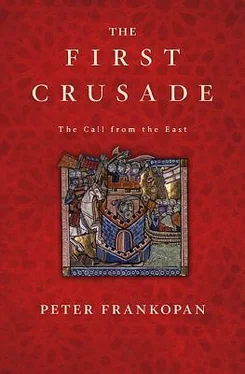With Bohemond too Alexios was prepared to be flexible and accommodating. The Norman agreed to become the emperor’s vassal in return for a specific agreement: ‘the emperor said that if he willingly took the oath to him, he would give him, in return, land in extent from Antioch fifteen days’ journey, and eight in width. And [Alexios] swore to him that if he loyally observed the oath, he would never pass beyond his own land.’ 92Yet the value of this concession was negligible; if anything, it was to the empire’s advantage. Encouraging Bohemond to take over lands that were beyond the empire’s traditional frontiers could result in the creation of a buffer zone between Byzantium and the Turks. From the Norman’s point of view, he would use the massive Crusader army for his own gains; this was particularly attractive given his limited prospects in southern Italy where his halfbrother and his uncle held sway. It was, in other words, an agreement from which both men stood to gain.
Bohemond was so pleased by the prospect of carving out a realm for himself that he intervened on Alexios’ behalf during the latter’s negotiations with Raymond of Toulouse. It was Bohemond who cajoled and eventually even threatened the most powerful member of the expedition, telling Raymond that if he continued to refuse to take the oath, he would take direct action against him personally. 93This endeared Bohemond to the rank and file of the entire expedition, who saw the disagreements between the leaders as distractions from the matter in hand of taking on the Turks in Asia Minor. Bohemond therefore took the credit for keeping the momentum of the Crusade going. It also endeared him to Alexios, who came to see his former rival as a valuable ally, someone with common sense and a common touch – in short, someone he could rely on.
Although the emperor had immediate concerns in 1096–7, as the Crusaders arrived in Byzantium, he also had an eye on long-term strategy when formalising his relations with the expedition’s leaders. He was particularly concerned about what would happen to towns and regions that were to be taken by the westerners as they crossed Asia Minor. This issue was addressed explicitly in the oaths that were made in Constantinople. Godfrey of Bouillon, along with other leading western knights, ‘came to the emperor and swore on oath that whatever towns, lands or forts he might in future subdue that had in the first place belonged to the Roman Empire, would be handed over to the officer appointed by the emperor for this very purpose’. 94
Reports of this arrangement quickly spread well beyond Byzantium, becoming widely known in the Muslim world. Well-informed commentators writing in Baghdad and Damascus knew the outline of the terms that had been concluded in the imperial capital. One wrote that when the Crusaders arrived in Byzantium, ‘the Franks, on their first appearance had made a covenant with the king of the Greeks, and had promised him that they would deliver over to him the first city that they captured’. 95Another focused on the determination and resolve shown by Alexios to get what he had wanted: ‘the Byzantine emperor refused them passage through his territory. He said, “I will not allow you to cross into the lands of Islam until you swear to me that you will surrender Antioch to me.”’ 96
Latin sources noted not only the commitments given by the western leaders but also those offered in return by Alexios. ‘The emperor’, wrote the author of the Gesta Francorum, ‘for his part guaranteed good faith and security to all our men, and swore also to come with us, bringing an army and a navy, and faithfully to supply us with provisions both by land and sea, and to take care to restore all those things which had been lost. Moreover, he promised he would not cause or permit anyone to trouble or vex our pilgrims on the way to the Holy Sepulchre.’ 97
In the coming years much was to turn on who fulfilled their obligations, with accusations of breaches levelled by both sides. But one thing was clear: Alexios perfectly understood the concept of fealty and acted like a western ruler, couching his requests for homage in language the knights were familiar with. Whether the emperor also recognised that these mutual commitments could be unpicked in difficult circumstances is another matter.
As the author of the Gesta Francorum was quick to point out, responsibilities cut both ways. When the Crusaders arrived in Constantinople, it was assumed that the emperor would be taking personal command of the expedition. After all, as the Crusaders converged at Kibotos, Alexios was behaving as their commander-in-chief, bestowing gifts, providing accommodation and food, co-ordinating their movements and advising on suitable tactics to use against the Turks. With his demand for oaths, furthermore, he had positioned himself as the central figure in the expedition.
This put Alexios in a difficult situation. He had called for help from the west because he urgently needed men to assist with a major reconquest of Asia Minor, after the advances of the Turks and the associated rebellion of the empire’s aristocracy had left him dangerously exposed. His ability to play an active role in the campaign was therefore limited, as Anna Komnene acknowl edged: ‘the emperor would have liked to accompany the expedition against the godless Turks, but abandoned the project after carefully weighing the arguments for and against: he noted that the Roman army was hopelessly outnumbered by the enormous host of the Franks; he knew from long experience, too, how untrustworthy the Latins were’. Alexios was also concerned about revolt breaking out in Constantinople in his absence. ‘So this was why the emperor decided against joining the enterprise at that time’, wrote Anna. ‘However, even if his presence was unwise, he realised the necessity of giving as much aid to the Kelts as if he were actually with them.’ 98
There was no need for the emperor to declare his hand just yet. He was able to accompany the Crusaders into Asia Minor and to take the lead in the initial operations. But he had presumably yet to decide what would happen if and when the expedition proved successful and started to make serious headway against the Turks. But by the late spring of 1097, things were going well for the emperor. He had successfully negotiated agreements with all the western leaders and had been careful to promise to help the expedition; nevertheless, whatever the western knights might have expected, he had at no stage indicated explicitly that he would lead them in person to Jerusalem. Their future relationship would depend largely on how successful the knights were. Alexios thus watched intently as the Crusader army advanced towards the first major target: Nicaea.
9
First Encounters with the Enemy
The Crusaders’ advance into Asia Minor was a story of victories and near-disasters, high violence and clashing egos. Alexios, forced by political instability to remain at the heart of the empire rather than venture out on expedition, sought to manage the campaign from afar. It was a high-risk approach, but, for the first year or so of the Crusade, a triumphant one.
The size of the force that assembled at Kibotos in the spring of 1097, numbering in the tens of thousands, was astonishing; the challenge of keeping them supplied was enormous. The slickly run operation at Kibotos impressed Stephen of Blois, who wrote to his wife describing the extraordinary amount of food and supplies that the Crusaders found waiting for them. 1Others too commented on the abundance of goods in the town, as well as the presence of a huge number of merchants selling wheat, wine, oil, cheese and other essentials to the westerners. 2
As in the Balkans, the price of these commodities was not left to market forces or to the whims of sharp traders. Even when the very first westerners reached Kibotos, reported one author, goods were supplied not only in large volume, but at fixed prices as a result of centralised imperial control. 3The plentiful provisioning kept morale high amongst the Crusader force; it also further boosted the emperor’s high standing amongst the western army. Regular distributions of money to the rank and file likewise produced a swell of goodwill and gratitude that left the assembled force determined to advance on the enemy at Nicaea. 4Alexios built on this enthusiasm, promising gold, silver, horses and more besides if the Turks were defeated and the town captured. 5
Читать дальше











